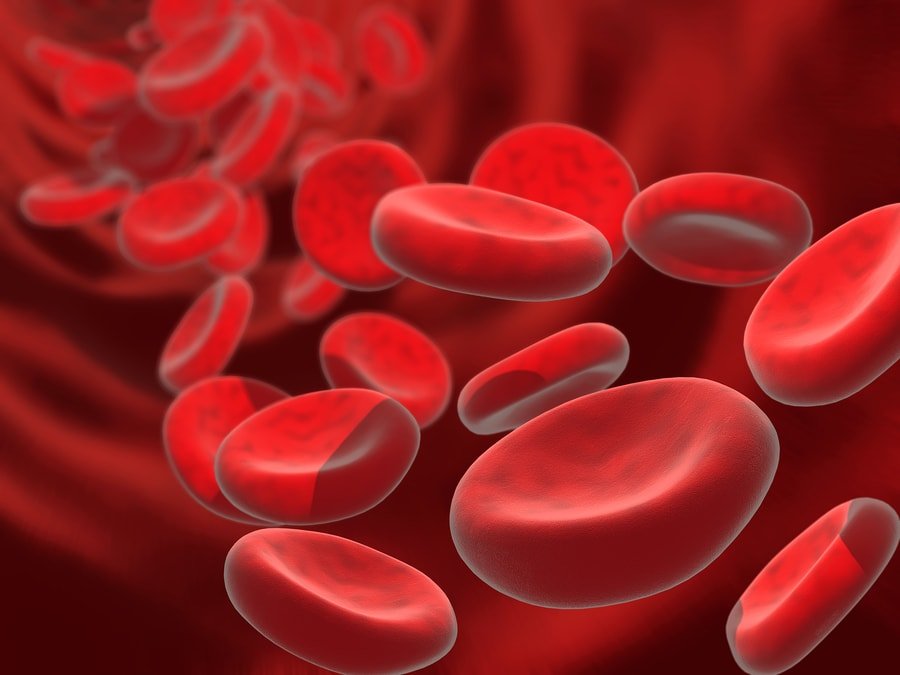
The primary function of the red blood cell is to transport oxygen to all parts of the body. Inflammation and nutrient deficiencies can reduce red blood cell numbers or their ability to effectively deliver oxygen. This condition is called anemia. However, having a high red blood cell count can also have a similar oxygen-depleting effect.
In this post, you will learn about the ways to increase or decrease red blood cell count.
What are Red Blood Cells (RBCs)?
Over 99% of the particles in the blood are cells called red blood cells (RBCs), or erythrocytes, due to their red color. Red blood cells look like a disc with indentations in the middle so they can bend easily to squeeze through narrow blood vessels [1].
Each red blood cell contains the protein hemoglobin, which transports oxygen [1].
In tiny blood vessels in the lungs, RBCs pick up oxygen from inhaled air and transport it through the bloodstream to all parts of the body.
Our cells need oxygen to function and make energy. At the same time, carbon dioxide is released as a waste product from the breakdown of carbohydrates and fats for energy. The RBCs pick up the carbon dioxide and transport it back to the lungs. There we exhale it when we breathe out [1].
Beyond Oxygen
Aside from oxygen and carbon dioxide, RBCs can also pick up or release hydrogen ions and nitric oxide [1].
By picking up or releasing hydrogen ions, they help keep the pH level (acid/base balance) of the blood steady [1].
When RBCs release nitric oxide, nitric oxide can cause the blood vessels to expand, which leads to a drop in blood pressure [1].
Ways to Increase Red Blood Cell Levels
If your RBC count is low, the most important thing is to work with your doctor to find out what’s causing your low RBC count and to treat any underlying conditions. While in some cases anemia can be treated with dietary changes and supplements, other cases may require blood transfusion, drugs that stimulate RBC production, or changing your medication.
The additional lifestyle changes listed below are other things you may want to discuss with your doctor. None of these strategies should ever be done in place of what your doctor recommends or prescribes!
1) Iron
Iron is necessary to make hemoglobin and red blood cells [2]. We get our iron mostly from foods, including red meat, poultry, fish, beans, lentils, tofu, tempeh, nuts, and seeds.
A deficiency in iron decreases red blood cell production [3].
If iron levels are low, this can often be corrected by making appropriate dietary changes or taking supplements. Furthermore, if your condition is serious, you doctor may prescribe iron therapy [3]. Keep in mind that It may take several months of supplementation to correct iron deficiency.
However, iron deficiency may also have non-dietary causes, such as bleeding or gut issues (malabsorption), in which case it can’t be corrected solely by dietary adjustments.
Never take iron supplements without first clearing them with your doctor. Large amounts of iron can be harmful because they increase oxidative stress in the body.
2) Vitamins B12, B9 (Folate), and B6
All of these vitamins are needed for the production of red blood cells. When either of them is low, red blood cell count decreases and a person can develop anemia [4, 5, 6, 7].
Deficiencies in these vitamins are much less common than iron deficiency.
Similarly to iron, they can be corrected by dietary adjustments, unless they have other underlying non-dietary causes.
3) Copper
Copper is another nutrient necessary for the production of RBCs [8, 9, 10].
As copper is needed in small amounts and widely available in food, copper deficiency is usually due to non-dietary causes.
4) Vitamin C
Vitamin C helps the body absorb iron. Therefore, if your iron is on the low side, eating iron-rich foods together with vitamin C sources can increase iron levels and can also boost red blood cell production.
Good sources of vitamin C are citrus fruits, kiwi fruit, strawberries, cantaloupes, broccoli, peppers, and tomatoes.
You can sprinkle some lemon juice over your steaks and salads, for example, or drink orange juice with your iron-rich meals.
Note: If you’re taking medicines, ask your doctor or pharmacist whether you can eat grapefruit or drink grapefruit juice. This fruit can interact with a number of medicines.
5) Vitamin D
In a lot of cases, red blood cells are low due to long-term disease or inflammation. This is called “anemia of chronic disease” [11, 12].
Studies suggest that vitamin D has an important role in lowering inflammation, but also that this vitamin gets depleted in chronic inflammation and disease. Early clinical trials have been promising, showing that vitamin D supplementation can help decrease inflammation and increase red blood cell levels in people with chronic diseases. However, further research is needed to establish the efficacy of vitamin D in this type of anemia beyond a doubt [13].
6) Avoiding Alcohol
Alcohol consumption decreases red blood cell production [14].
7) Exercise
Exercising regularly can increase red blood cell levels and hemoglobin. That’s because when muscles work more, they need more energy and more oxygen. Moderate physical activity signals your body to increase red blood cell production in order to increase the oxygen supply to your muscles [15].
However, strenuous exercise can have the opposite effect. It can actually damage and destroy red blood cells. This is one of the reasons that endurance athletes often have anemia [16].
8) Drugs
In many cases, there are drugs that can treat the underlying cause of anemia, and thereby increase red blood cell count. These include:
- Antibiotics to treat infections
- Hormones to treat heavy menstrual bleeding in teenage and adult women
- Medicines to prevent the body’s immune system from destroying its own RBCs (in autoimmune disease)
- Chelation therapy in cases of heavy metal toxicity
There is also a hormone called erythropoietin (EPO), that is made in the kidneys and stimulates red blood cell production (erythropoiesis) [17].
EPO can also be used as a therapeutic agent for the treatment of anemia associated with various conditions such as kidney disease, chemotherapy, inflammatory bowel disease (IBD), autoimmune disease, HIV, RBC disorders, and blood loss following surgery or trauma [18, 19, 20, 21, 22, 23, 24, 25, 26].
9) Blood Transfusions
This is a common procedure in which blood is given intravenously, often when there is a significant loss of blood due to injury or surgery. Transfusions require careful matching of donated blood with the recipient’s blood [27].
10) Blood and Marrow Stem Cell Transplant
A blood and marrow stem cell transplant replaces faulty stem cells with healthy ones from another person (a donor). Once the stem cells are in the body, they travel to the bone marrow which can begin making new blood cells [28].
Ways to Decrease RBC Levels
The most important thing is to work with a doctor to find out what’s causing a high RBC count and to treat any underlying conditions. The additional lifestyle changes listed below are other things you may want to discuss with your doctor. None of these strategies should ever be done in place of what your doctor recommends or prescribes!
1) Quitting Smoking
Smoking increases your red blood cell count [29, 30, 31]. Quitting can help decrease it.
2) Strenuous Exercise
In people who have a tendency for slightly elevated red blood cell levels, strenuous/endurance exercise may help decrease them [32, 33].
But remember, if you’re unsure of your health, have existing medical conditions, or are pregnant, you should always speak with your doctor before starting a new exercise program!
3) Phlebotomy or Blood Draw
This is a procedure that removes a certain amount of blood from the body. The process is similar to the process of donating blood. It reduces red blood cell count and brings the blood density closer to normal. It’s usually used in certain conditions in which there is abnormally high production of red blood cells, such as polycythemia vera or sickle cell disease [34].
4) Drugs
In certain cases, a doctor may prescribe drugs can be used to increase red blood cell loss (aspirin) or to prevent the bone marrow from making too many RBCs (hydroxyurea and interferon-alpha) [35].



